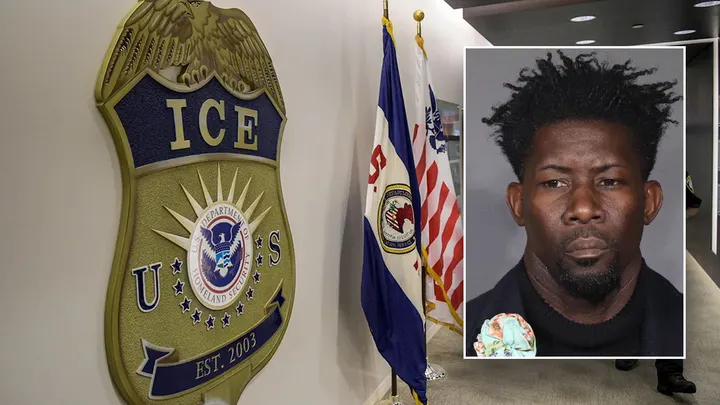ZeroHedge: Doing work that Americans won’t do: Guyanese illegal making >$300k as school superintendent deported
Democrats expressed “national outrage” after the ICE arrest of Ian Roberts, an illegal alien from Guyana who somehow became the Superintendent of Des Moines Public Schools, the largest school district in Iowa. Roberts competed as an Olympic athlete and distance runner for Guyana 25 years ago, but this apparently didn’t help him escape immigration enforcement and his active warrants.
At the time of his arrest, Roberts was working as the Superintendent despite being an illegal alien with a final order of removal and no work authorization. He was caught with a firearm in his possession (which is illegal to carry for a non-citizen), as well as a hunting knife and $3000 cash. Roberts had previous warrants for weapons possession charges in February of 2020.
Democrats claim that these ICE arrests and Trump’s deportation policies are directly to blame for the now numerous shootings committed by leftist activists. In other words, conservatives who are enforcing constitutional immigration laws are to blame when leftists try to kill them.
During a targeted enforcement operation on Sept. 26, 2025, officers approached Roberts in his vehicle after identifying himself, but he sped away. Officers later discovered his vehicle abandoned near a wooded area. State Patrol assisted in locating the subject and he was taken into ICE custody.
“This suspect was arrested in possession of a loaded weapon in a vehicle provided by Des Moines Public Schools after fleeing federal law enforcement,” said ICE ERO St. Paul Field Office Director Sam Olson. “This should be a wake-up call for our communities to the great work that our officers are doing every day to remove public safety threats. How this illegal alien was hired without work authorization, a final order of removal, and a prior weapons charge is beyond comprehension and should alarm the parents of that school district.”
The arrest spurred a protest outside the federal courthouse in Des Moines.
In response to the arrest, protesters mobilized under what appears to be the Party for Socialism and Liberation, a radical leftist group linked to the Los Angeles riots and connected to Neville Roy Singham, a U.S. billionaire with reported ties to the Chinese Communist Party (CCP) and to extremist organizations that fuel division and civil chaos nationwide.
Video and images show professionally produced “Free Roberts” signs with PSL symbols, indicating the protest was likely artificial rather than organic. The activity aligns with the broader protest-industrial complex and appears linked to dark-money NGO networks backed by Singham.
Civil terrorism expert Jason Curtis Anderson of One City Rising comments on the story and provides readers with additional context about PSL’s protest involvement:
The Party for Socialism and Liberation (PSL) is a core component of the Neville Roy Singham operation. Their #1 goal is to exploit the fault lines in our society, destabilizing the existing system, and induce the American population into supporting communism.
The PSL is their political party, which runs people for office, and last year, ran Claudia De La Cruz for President, getting her on the ballot in 19 states. The PSL played a lead role in the nationwide campus encampments, but the wider Singham network also has their own network of educators. They are capturing the universities from the top down and bottom up.
The PSL protesting on behalf of armed conman (and alleged illegal alien) Ian Roberts serves all of their agendas:
- It shows solidarity with people of color
- It shows solidarity with illegal immigrants
- It attacks ICE (The most violent anti-ICE riots were in California and Texas, both led by the PSL)
- It gives them an excuse to create more social division and bloviate about how this is a fascist country
Nobody in America should want a foreign national who was arrested with a loaded gun and $3k in cash around their kids. But for the PSL and the wider Singham network, they don’t want America to abide by laws, especially as it pertains to immigration. This event marked a new enforcement in this sector. A chess piece was taken off of the board, and they are angry about it. Capturing education is a huge part of Singham’s strategy, and while Ian Roberts was not ‘in network’ just yet, the Singham network has already made significant progress on developing a “network of educators” to help them carry out their goals.
The Iowa Board of Educational Examiners issued Roberts a license to serve as Superintendent in the state in July 2023, according to Norris.
“There is new information that has been made public that we did not know, and we have not been able to verify,” Norris said.
Roberts entered the US on a student visa in 1999, on which he overstayed. He had no work order and was given a final order of removal by an immigration judge in May 2024 (under Joe Biden), according to the DHS statement. Des Moines public school officials claim they were not aware of the order of removal. The leftist sentiments and calls for “radical empathy” from those same officials suggest, however, that they were likely aware of his immigration status and hired him anyway.
Not surprising…
I found this bio on the British Amazon for Dr Ian Roberts, from around 2011.
What it shows is that Roberts’ career was that of an itinerant charter school principal in rough urban school districts. Very few of these schools got “turned around.” Many have since closed. pic.twitter.com/RjmFsIYa5c— CowLivesMatter (@ProtesterLone) September 27, 2025
The arrest highlights the dark cloud of far-left ideology plaguing the U.S. school system and the unfortunate reality that many district officials enable the spread of woke propaganda in American education. It also underscores the Democrats’ doubling down on ignorance, showing more sympathy for criminals than for innocent citizens. Moreover, the arrest and subsequent protest mobilization reveal how Democrats and their radical leftist dark-money NGO networks mobilize force whenever their power is threatened, especially when one of their own is removed from a position of authority within Des Moines public schools. Remember: indoctrination and nation-killing policies often begin in classrooms — and Democrats used an illegal alien to spread toxic woke.













